Budget

FOR SOME REASON, conversations about economics and the church are rare these days — even though scripture includes more than 2,000 verses on poverty, such as laws in the Hebrew Bible on debt, labor, and land ownership. In the gospels, Jesus had many conversations with people about their relationship to money.
Our daily lives wade in the waters of economics, even in the most ordinary ways. When I brushed my teeth this morning, for instance, I used a brand-name electric toothbrush and a brand-name toothpaste, one that claims to be gentle on tooth enamel. After leaving my apartment, I gazed ahead to the street corner, where a man with a familiar face extended his hand in need to passersby. On the streets of New York City, the human cost of economic insecurity is painfully evident. I made my way eastbound toward Park Avenue; the potholes had me pondering how my hood is often overlooked in the city’s infrastructure budget. Yet, somehow, new “affordable” luxury apartments pop up, seemingly out of nowhere; I sometimes wonder if these buildings just appear overnight, ready-made. I’m also reminded that our local community board, through its land use committee, had some say in these new developments.

As lawmakers on Capitol Hill argue about the national debt, the Bible verse that’s been on my mind is Proverbs 3:27: “Do not withhold good from those to whom it is due, when it is in your power to act.”

As followers of Jesus, bringing “good news to the poor” and promoting peace should be at the center of our worldview and vocation. In our advocacy work at Sojourners, we constantly find ourselves trying to convince our country’s decision-makers to prioritize government spending that provides a lifeline to people experiencing poverty. Unfortunately, we have often found that securing adequate resources to help people lift themselves out of poverty is a constant uphill battle. While I believe in the importance of fiscal responsibility, when members of Congress become concerned about the national deficit, the programs that wind up on the chopping block are usually the programs that offer a safety net to those who are most vulnerable — while military spending continues unchecked.
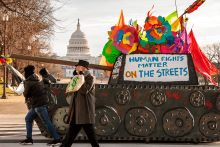
In the letter, the scholars criticize the budget being set $25 billion higher than President Joe Biden had requested. They write that the country urgently needs to “shift our security and foreign policy strategy” to break cycles of violence, cultivate peace, and practice constructive conflict.
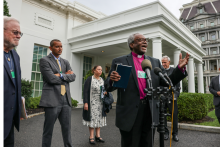
We've long argued that budgets — including our federal budgets — are moral documents. As Christians, we see this as a principle deeply rooted in scripture, including Luke's gospel, which explains that the two greatest commandments are to love God and love our neighbors (Luke 10:27). In that same passage, Jesus tells the parable of the Good Samaritan, a story about how our love for God and neighbor will be tested when our neighbors need us the most.

For Christians who reject Dave Ramsey’s financial advice and the theology that supports it, it’s not always clear where to find alternatives.
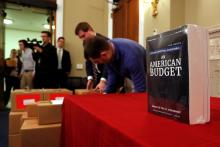
This week the Trump administration released a new idea for domestic food aid. They want to send boxes to people who are recipients SNAP/food stamps, while slashing about half of what they can use via Electronic Benefit Transfer cards at grocery stores.
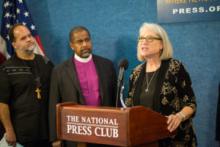
Further, this proposed budget seems to be based on an assumption that poor people and children should fund our national defense. The National Council of Churches and the Circle of Protection do not agree. The biblical prophets teach us that our security depends on upholding justice for people in poverty. Common wisdom in our own time tells us, “a hungry man is an angry man.”

We come as women and men of faith. Though separated by physical distances, cultural differences, and faith traditions, many of us united in prayer and fasting in May, directed toward God’s intervention in the politics of the United States, especially as it relates to the poor and vulnerable. We pray for wisdom for our governmental leaders, but we are committed to continued advocacy for those most in need of society’s safety nets.

When we say the most vulnerable or the “least of these” we are not talking about numbers on a page. We are talking about the elderly — grandmothers and grandfathers, deacons, trustees, and ushers, children’s ministry workers, community leaders, and those who have worked for decades to provide for themselves and their families. We are talking about children and youth who were born with purpose and possibilities, who have their whole lives ahead of them, future pastors, and lay leaders, lawyers, teachers, journalists, and members of Congress — those who will determine the future our nation. We’re talking about those who have disabilities and those who work hard every day – sometimes two and three jobs to make ends meet and provide for their families but get paid low wages that do not cover the high cost of living in most cities and towns in our nation.
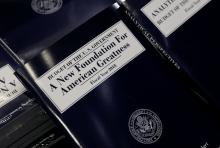
We will be making this joint statement under the banner of the Circle of Protection, a broad coalition of leaders from all the families of U.S. Christianity that was founded in 2011 in service of the biblical mandate to protect poor and vulnerable people. While individual members of the Circle have raised their voices in opposition to harmful budget cuts and legislation that the Trump administration and Congress have proposed — notably many of us came together for a powerful prayerful event outside the Capitol Building in late March for just such a purpose —this will be the first time that the entire Circle is making such a joint statement.
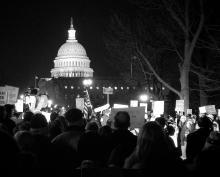
Social and economic inequities are not just personal attitudes — they are the result of structural problems prevalent in many sectors of society and government. In the face of this reality, the federal government can be a force for good, attempting to correct its own past complicity and working to prevent future discriminatory behavior by businesses, schools, contractors, local police departments, and more. But this administration’s disregard for civil rights in the federal agencies it administers leads to an inescapable conclusion.

Poverty is not inevitable. It is a systemic sin, and all Christians have a responsibility to partner with the poor to end poverty once and for all. “The poor you will always have with you” is actually one of the strongest biblical mandates to end poverty. Matthew 26:11 quotes Deuteronomy 15, one of the most liberating Sabbath prescriptions in the Bible, and an instruction on how to follow God’s commandments to end poverty, forgive debts, and release slaves.

We celebrated the failure of a cruel bill. We celebrated our powerful unity across other theological and political differences and our clear opposition to cutting the poor out of the critical budget decisions which now lie ahead. Yes, we celebrated. But we remain vigilant.

FOR IMMEDIATE RELEASE
Contact: Michael Mershon, Director of Advocacy and Communications
Phone: 202-745-4654
Email: mmershon@sojo.net
March 29, 2017
Today, a diverse group of Christian leaders held a press conference and prayer vigil on Capitol Hill to protest proposed legislation that would disproportionally harm poor and vulnerable people. The leaders are members of the Circle of Protection, a broad coalition from all the families of U.S. Christianity who have come together around the biblical mandate to protect poor people

We are awakening now to at least some of the consequences of devoting our dollars toward death. As we contemplate the toll that endless war is taking on education, the environment, housing, and healthcare, may our hearts expand in empathy — not only to our immediate neighbors, but to our neighbors around the world. None of us can afford to lose any more.
Where our treasure is, there our heart will be also. Let us invest our treasure in building one another up — here, and around the world — that we may mend our hearts and resurrect our humanity.

A common misconception is that to be a pro-life Catholic, one simply has to be anti-abortion and anti-contraception. For years this “pro-life” definition has largely been unchallenged. That is, until recently.
A poll conducted in 2014 by the Public Religion Research Institute found a majority U.S. Catholics favor greater government involvement on economic issues via minimum wage increases, infrastructure investments, and universal healthcare. Furthermore, U.S. Catholics believe that to promote economic growth, the government should raise taxes. These aren’t just pro-growth policies, they’re pro-life policies.

FOR IMMEDIATE RELEASE
Contact: Michael Mershon, Director of Advocacy and Communications
Phone: 202-745-4654
Email: mmershon@sojo.net
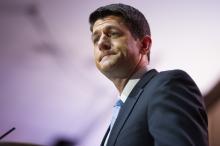
If House Speaker Paul Ryan truly wants to promote a “compassionate conservative” agenda that counters the divisive rhetoric of the presumptive Republican presidential nominee Donald Trump, Ryan should follow the example of one man: Pope Francis.
